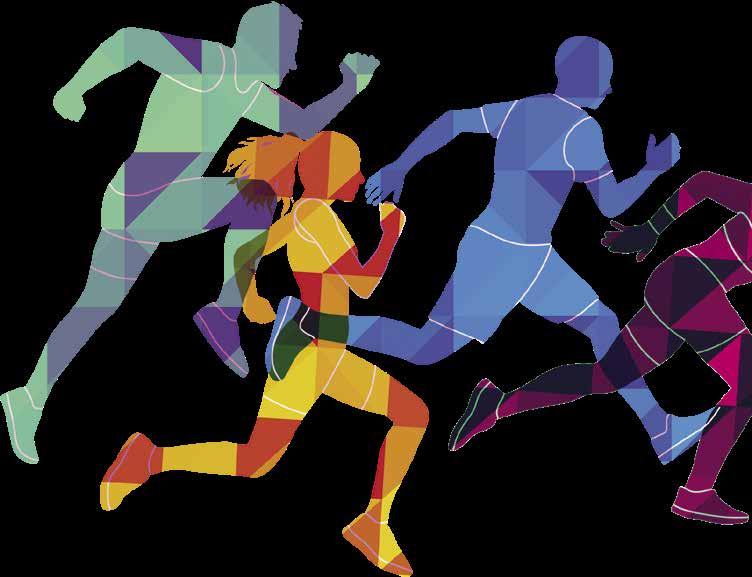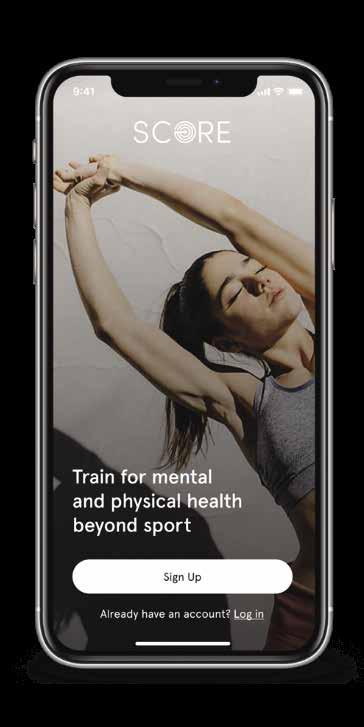
5 minute read
SCORE Aims to Prepare Athletes for Life
The sports industry – from youth through professional levels – represents a multi-billion-dollar market in the United States. Even the youngest athletes are often heavily invested in their sport, with their lives revolving around practice, sleep, diet and nutrition, and competition. Their chosen sport frequently becomes their identity.
Tiffany Stewart, PhD is the Dudley and Beverly Coates Endowed Professor and the Director of the Behavior Technology Laboratory at Pennington Biomedical Research Center. As a licensed clinical psychologist, she has spent 25 years researching ways to improve mental and physical health and resilience among high performance populations, particularly the military and athletes.
Advertisement
In 2015, Dr. Stewart recognized that despite all the billions of dollars spent on sports – from training to travel to equipment – there was a huge gap for mental health and resilience tools for athletes. It was then she began pursuing the idea of creating tools to put directly in the hands of struggling athletes.

“We have known for some time that athletes of all ages are reporting increased mental health struggles - 150-250 percent higher than historical rates. In the NCAA, 21 percent of student athletes report anxiety while another 13 percent report depression. But only 55-60 percent report that they know how to access mental health support,” she said.
“The Covid pandemic only accelerated this phenomenon. We are seeing the athletes themselves really begin to talk openly about mental health, including Michael Phelps, Naomi Osaka, and Simone Biles. It is my hope that we can use this momentum to take a more holistic perspective toward athlete health and well-being by adding mental health prevention and skills training tailored to athletes that includes stress management and coping,” she added.
As a former competitive gymnast herself, Dr. Stewart is uniquely aware of the challenges that athletes face. She is a pioneer in the development and testing of e-health technologies and community participatory programs that bring prevention and treatment efforts to large populations in need.
Dr. Stewart and her team developed the S.C.O.R.E. (Sport Carried Onward for Resilience & Enrichment) Program for Athletes, an evidence-based program that informs and trains athletes on how to put mental health and resilience skills into action while both in sport and while tran-

Tiffany Stewart, PhD
Dudley and Beverly Coates Endowed Professor; Director, Behavior Technology Laboratory: Eating Disorders and Obesity; Director, Pennington Biomedical Diabetes Clinic

Lori J. Bertman
sitioning out of sport. S.C.O.R.E. tackles issues such as nutrition, sleep, and exercise habits, re-establishing sense of self-identity, dealing with lingering injuries, physical and mental health (depression and anxiety) challenges, and direction in life in an effort to prevent more severe consequences of struggle, such as suicide.
“If we can head off mental health struggles from the start and the athlete never becomes depressed, that’s the real win. What we’ve learned from 20 years of research with high performance populations is that one, athletes and soldiers are not immune to mental health struggles, and two, that athletes and soldiers will use technology-based tools to manage health and performance and have high satisfaction with such tools,” Dr. Stewart said.
S.C.O.R.E. builds off of a similar telehealth app that Dr. Stewart built for the US Army that provides nutrition, fitness, sleep, and mental resilience skills training.
The public at large still expects athletes to push through injuries and ailments, both physical and mental. This leads athletes to seek guidance from performance-based psychology individuals, but rarely for subclinical and clinical mental health disorders. This is often due to lack of resources and the stigma of seeking help in a high-performance environment.
“It is estimated that 32 percent of adolescents suffer from some form of an anxiety disorder. Participation in sports can further increase challenges with anxiety and depression through the culture of ‘pushing through’ and having their performance become a source of their self -worth,” Dr. Stewart said. “Through our work, athletes have asked for help with providing the resources that not only inform them but also train them in how to put evidenced-based mental health and resilience skills into action.”
Few people think about when an athlete retires and their identity is their sport. Retirement isn’t even always planned and can begin for any number of reasons: injury, burnout, aging out, or not being able to proceed to the next level. COVID prematurely ended many athletes’ careers.
When sport ends, many athletes are forced for the first time to figure out who they are without sports. They often have reduced their identity to their physical capabilities and have lost touch with the other aspects of their person.
“SCORE is about adding in the positive coping and resilience training with their physical training and preparing for retirement while still in sport. That way, whether an athlete’s sport ends unexpectedly due to an injury or because of graduation, the student knows their whole identity and is prepared for life outside of sport,” she said.
The Irene W. and C.B. Pennington Foundation recognized the value of such an incredible tool and in December of 2020 awarded Dr. Stewart and Pennington Biomedical a grant to further develop the program. With this gift, Dr. Stewart designed the S.C.O.R.E. prototype and eventual app product. She is actively seeking individuals or organizations with an interest in this area to further donate to the work of fully building the technology aspect of the tool and to beta-test it in athletes.
Lori Bertman, President and CEO of the Irene W. and C.B. Pennington Foundation said, “Mental health and health equity have always been vital elements of the Pennington Family Foundation’s mission. In our years partnering with Athletes for Hope, working with athletes at all levels, we’ve recognized them as a model for good mental health addressing the mental health crises athletes across every sport face. We also recognize their potential as role models and advocates for healthy models and access to health in their communities. We have a long relationship with Pennington Biomedical Research Center, and we appreciate our partnership with Dr. Stewart and her team on the important work that they do.” •






